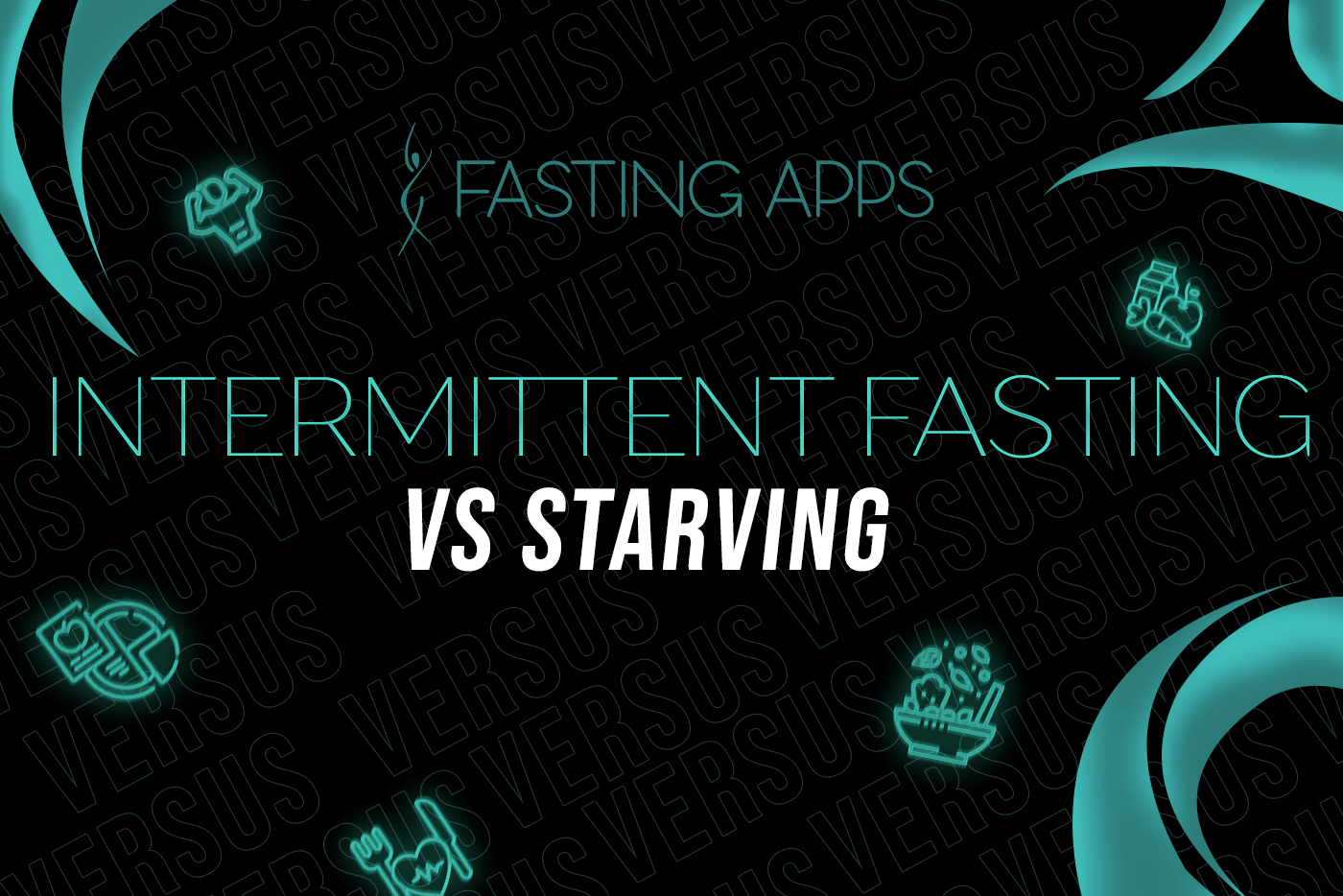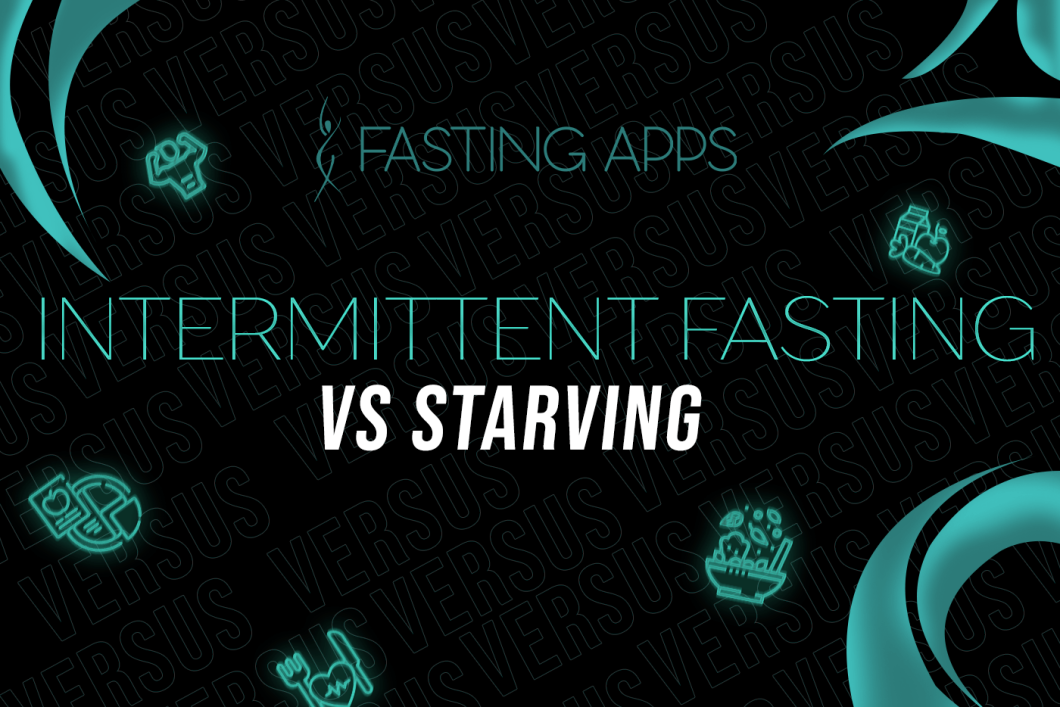Intermittent Fasting vs Starving
Written by Andrew Brewer. ⚕️Reviewed and fact checked by our medical team.

For the uninformed, intermittent fasting may sound like starving, but it could not be further than the truth. Intermittent fasting is a strategic way to eat, focusing on when you eat to help trigger healing processes within the body. It’s not about depriving your body of nutrients; instead, it’s about being strategic to help your body undergo core processes.
You should never starve yourself. It is not good for your long-term health, nor is it sustainable. You need food to fuel core processes, and while you may lose weight at first, your progress will quickly stall as your body works to conserve energy.
Key Takeaways
Intermittent fasting is a structured eating program that focuses on when you eat, not what you eat, and it can be a safe and effective way to manage your weight while also improving your overall health.
Starving yourself is never a healthy or sustainable way to lose weight. It can cause severe harm to your health, including muscle loss, reduced bone density, and weakened strength.
Intermittent fasting can boost your metabolism, help improve your blood sugar levels and cholesterol, and can be an effective way to lose weight while still providing your body with the necessary nutrients for basic functions.
If you are considering intermittent fasting, it is essential to consult with a doctor before trying it, especially if you have a history of eating disorders or any underlying medical conditions.
Benefits of Intermittent Fasting
Intermittent fasting is a structured eating program that focuses on when you eat, not what you eat. Depending on the program you choose, you have eating windows, where you pack calories and nutrients to help fuel your base activities. Once you burn through your calorie stores, your body will turn to burn fat stores. This is where the weight loss happens. But the key here is that when you aren’t fasting, you’re still eating. You focus on healthy foods like protein, fiber, and healthy fats, and by doing so, you can also help improve your blood sugar levels, cholesterol, and more.
Benefits of Starving
There are no benefits to starving. It is not healthy, sustainable, or beneficial for your day-to-day life. At first, you may notice weight loss, but it will quickly stall as your metabolism pauses to help conserve energy. You want to eat at a calorie deficit to lose weight, not stop eating altogether. You need food to live, so starving yourself is never the answer. When you do eat, your body may take longer to process the food, making you feel bloated and uncomfortable. If you want to limit your eating windows, you should try intermittent fasting, which is effective at weight loss.
What are the Differences?
Some people may think that intermittent fasting is a controlled form of starving, but that is not true. Of course, if you have struggled with eating disorders in the past, the lines may be blurred, so consult with a doctor before you try intermittent fasting.
Eating
When you starve yourself, you stop eating altogether. When you’re intermittent fasting, you limit your eating to certain windows during the day or the week. You are still able to eat during your eating windows. This will help give your body the nutrients and energy it needs to power its daily functions before moving to fat stores. If you want, you can restrict your calories during intermittent fasting, but it is not recommended.
Metabolism
Intermittent fasting can boost your metabolism, helping you burn through your food and fat to lose weight. Starving yourself may cause you to lose weight at first; unfortunately, over time, starvation will cause changes to your metabolism, slowing it down. When you do eat, you will not be able to burn through the food as quickly because your body is trying to conserve energy. It is not healthy and can have long-reaching negative impacts on your overall health and well-being.
Body Composition
Starving will harm your body composition, causing you to lose muscle mass, reduce your bone density, and decrease your strength. You will feel weaker when you are starving yourself because you have no energy. You will be tired and lethargic, which is much different from temporary slumps during fasting.
How to Choose?
There is no choice. Starvation is never the answer when it comes to weight loss. You will severely damage your overall health and well-being, causing serious issues that will last for years. Intermittent fasting can be a safe way to limit your eating windows, helping you get your core nutrients.
Our #1 Recommendation: DoFasting
It's easily one of the best intermittent fasting apps that offers plenty of features for anyone!
Use coupon code: 10app to get an extra 10% off all memberships.
FAQ
How does intermittent fasting differ from starving?
Intermittent fasting is a controlled way of limiting calorie intake, while starving is an extreme calorie restriction that can lead to severe health problems.
What are the potential dangers of starving?
Starving can lead to a range of health problems, including muscle wasting, organ damage, weakened immune system, and in severe cases, death.
Is intermittent fasting safer than starving?
Yes, intermittent fasting is considered safer than starving because it allows for controlled calorie restriction and does not lead to extreme nutrient deficiencies or starvation mode.
Can intermittent fasting lead to malnutrition?
Intermittent fasting can lead to nutrient deficiencies if not done properly, but this can be prevented by eating a balanced diet during the eating periods.
How does intermittent fasting affect metabolism compared to starving?
Intermittent fasting can boost metabolism and improve insulin sensitivity, while starving can slow metabolism and lead to hormonal imbalances.
Can intermittent fasting lead to muscle loss?
Intermittent fasting can lead to some muscle loss, but this can be prevented by regular resistance exercise and consuming enough protein during eating.
How does intermittent fasting affect energy levels compared to starving?
Intermittent fasting can improve energy levels by reducing insulin resistance and promoting fat burning, while starving can lead to fatigue and weakness due to nutrient deficiencies.
Can intermittent fasting improve overall health compared to starving?
Intermittent fasting has been linked to various health benefits, including weight loss, improved insulin sensitivity, lower inflammation, and reduced risk of chronic diseases such as diabetes, heart disease, and cancer. At the same time, starving can lead to a range of health problems and is not recommended as a long-term solution.
How does intermittent fasting compare to other diets in terms of effectiveness?
Intermittent fasting is as effective as other diets for weight loss and may offer additional health benefits, but individual results may vary, and a personalized approach is recommended.

